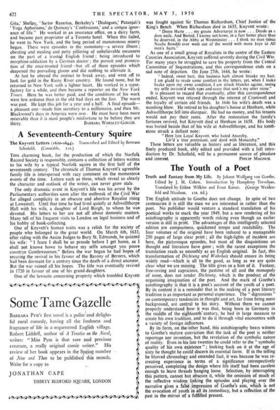A Seventeenth-Century Squire
The Knyvett Letters (162e-1644). Transcribed and Edited by Bertram Schofield. (Constable. 2 I 9.) Tms charming book, for the production of which the Norfolk Record Society is responsible, contains a collection of letters written to his wife by a typical Norfolk squire in the first half of the seventeenth century. The chronicle of Thomas Knyvett's agreeable family life is interspersed with racy comment on the momentous events of the time. Letters such as these, which reveal so clearly the character and outlook of the writer, can never grow stale.
The only dramatic event in Knyvett's life was his arrest by the Parliamentary authorities soon after the outbreak of the Civil War for alleged complicity in an obscure and abortive Royalist rising at Lowestoft. Until that time he had lived quietly at Ashwellthorpe Hall with his wife, a daughter of Lord Burgh, to whom he was devoted. His letters to her are not all about domestic matters. Many tell of his frequent visits to London on legal business and of his hobby of book-collecting.
One of Knyvett's human traits was a relish for the society of people who belonged to the great world. On March 6th, 1633, after riding with the Assize Judges to Bury St. Edmunds, he quizzed his wife: " I feare I shall be so proude before I get home, as I shall not knowe howe to behave my selfe amongst you poore countrye Gentleweomen." Before the war began he had hopes of securing the revival in his favour of the Barony of Berners, which had been dormant for a century since the death of a direct ancestor. But the war ruined all his hopes. The title was eventually revived in 1720 in favour of one of his grand-daughters.
One of the lawsuits concerning property which troubled Knyvett was fought against Sir Thomas Richardson, Chief Justice of the King's Bench. When Richardson died in 1635, Knyvett wrote:
" Deere Harte . . . my greate Adversarye is now . . . Deade as a dore naile, And Buried, I knowe not howe, in a farr better place than he deserved, in the Abby at Westminster . . . I think no man (since Noahs flowdd) ever went out of the world with more Joye to All men's harts."
As one of a small group of Royalists in the centre of the Eastern Counties Association, Knyvett suffered severely during the Civil War. For many years he struggled to save his property from the Central Committee of Sequestrations, and this correspondence ends on a sad note of dejection. On June 27th, 1644, he wrote:
" Indeed, sweet hart, this business hath almost broake my hart.
I am gladd to reade some comfort in thy letters, yet, when I looke backe upon my owne condition, I am struck blancke againe, seeing
my selfe inviron'd with eyps and cares that seek's my utter mine."
It is pleasant to reqord that eventually, after this correspondence ended, Knyvett was rescued through the interest of Cromwell and the loyalty of certain old friends. In 1646 his wife's death was a numbing blow. He retired to his daughter's house at Henham, while Ashwellthorpe fell into disrepair. He had no money, and his tenants would not pay their rents. After the restoration the family's fortunes revived, but Knyvett died at Henham in 1658. His body was buried beside that of his wife at Ashwellthorpe, and his tomb- stone struck a defiant note: " Here lyes Loyal Knyvett, who hated Anarchy,
Liv'd a true protestant, and dyed with Monarchy."
These letters are valuable as history and as literature, and this finely produced book, ably edited and provided with a full intro- duction by Dr. Schofield, will be a permanent source of ..Aiplea.re






































 Previous page
Previous page